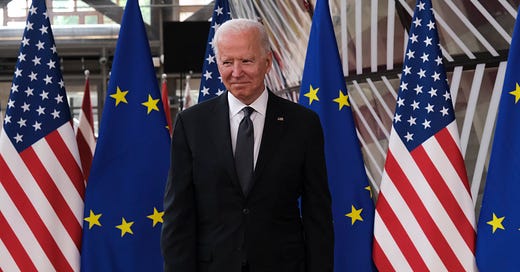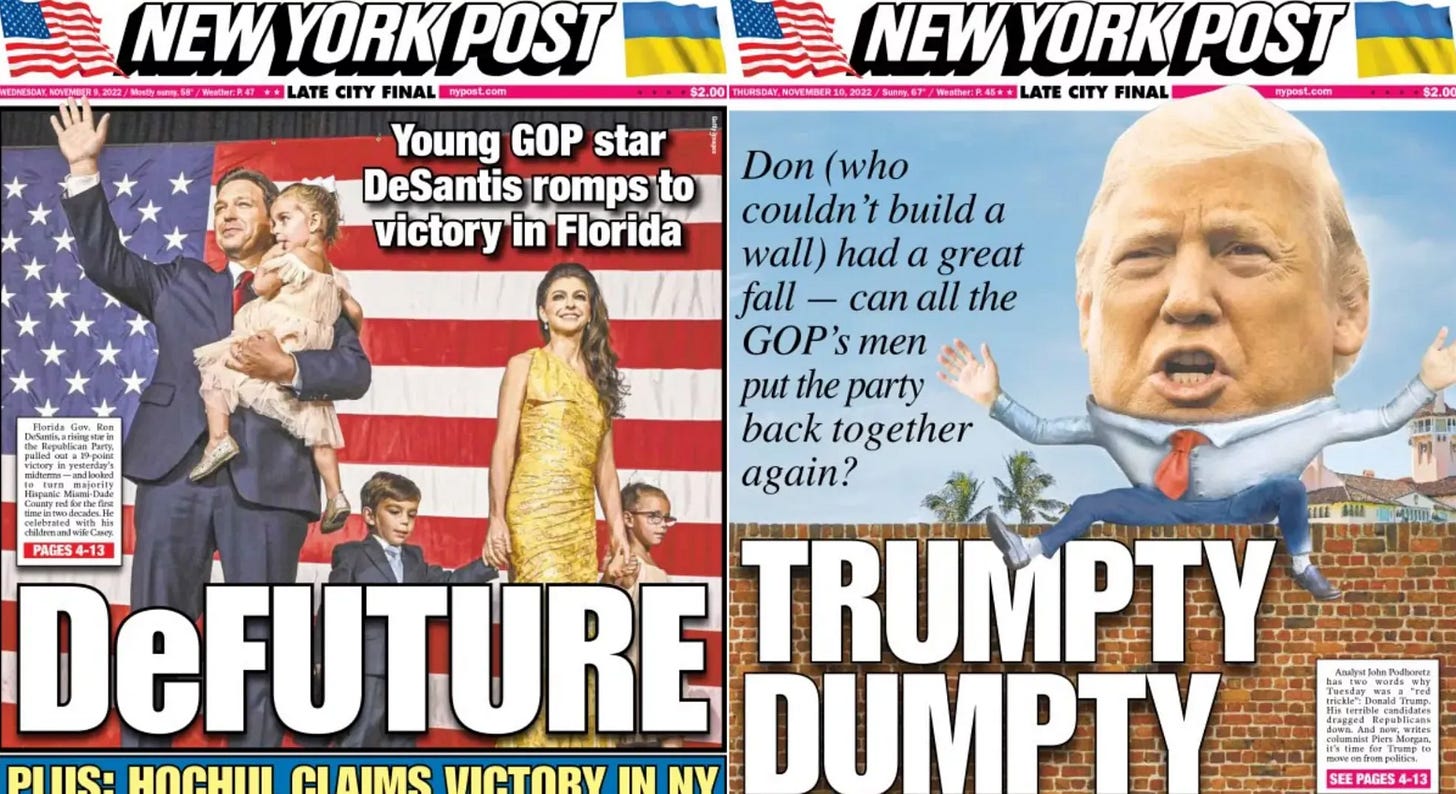As a rule, I hate getting predictions wrong but I’m delighted to make an exception for the US midterm elections.
A month ago, as the polls and betting odds turned, I warned that the Republicans were "odds-on to win both houses and handcuff [Joe] Biden until the end of his presidency in 2025", so upending the "political backdrop” to the war in Ukraine. Thankfully, the polls1 (and therefore the betting) were way off and today the alliance to defeat Russian president Vladimir Putin is intact.
The US, its European allies and Ukraine aren’t out of the woods. The Republicans may have lost the Senate but they still won the House of Representatives with a majority that empowers the party’s isolationist fringe. That a demagogue like Kari Lake came within a percentage point of winning the governorship of Arizona is a reminder of how strong that fringe still is. More than 200 officials who claimed the 2020 election was rigged in Biden's favour won their races. Donald Trump has declared his candidacy for 2024 and, even if his third bid founders, his strongest challenger is Ron DeSantis, the Orbánist governor of Florida. The EU and its eastern applicants can’t afford to feel any more than immediate relief and should put the same effort into achieving military and diplomatic autonomy they are devoting to weaning themselves off Russian energy.
Nevertheless, the absence of the promised red wave2, the defeat of all but one of the Trump-endorsed candidates, and the scale of the Democrats’ victories in Michigan and Pennsylvania have rebalanced geopolitical risk over the coming two and maybe even six years. Biden will still face congressional investigations into his son’s Ukrainian business links but the Republicans’ slender House majority makes impeachment less likely and will hobble nationalist attempts to block “another penny” going to Kyiv. Senate Republicans remain under the thumb of re-elected minority leader Mitch McConnell, who wants the Biden administration to be “quicker and more proactive” in its provision of lethal aid to Ukraine.
Even better news is the medium-term damage done to Trump. Granted, establishment Republicans have turned on him before and then retreated. But this time feels different as it dawns on conservatives – after three successive defeats in the 2020 presidential election and the 2018 and 2022 midterms – that Trump and the supreme court they begged him to appoint could sink them in 2024. In DeSantis – with the unabashed support of Rupert Murdoch’s media outlets (below) – they now have political cover. With his self-discipline and Orbánist culture war-making, a President DeSantis would be an unpleasant experience for liberal Americans but he wouldn’t pose the same threat to NATO, Ukraine and free trade as Donald II.
Peace through strength
For months, policymakers in Washington, Kyiv and Moscow have been convinced that the EU was the weakest link in the anti-Putin alliance. As winter and the energy-price shock bit, they believed, pitchfork-wielding citizens would force their governments to impose a premature settlement on the Ukrainians. Based even on the recent history of German, Italian, Spanish and French diplomatic and military campaigns in the Balkans and Afghanistan, this opinion makes superficial sense but it underestimates how much has changed in Europe since February.
The EU’s internal balance of power has tilted. Countries long considered peripheral to strategic decision-making – like Finland, Sweden, the three Baltic states and especially Poland – have cohered into a formidable borderland faction. Not only is determined Ukrainian resistance essential to their short-term defence but their long-term national-security interests are served by a permanent weakening of Russia and the emergence of a northeastern military bulwark with Ukraine as the tip of the spear.
Admittedly, these kinds of emergent intra-EU alliances have popped up before and then crumbled as the French chose to “hug close” their pacifistic German neighbours to discourage resurgent neutralism and isolationism in Berlin. One big difference this time is that the traditionally Ostpolitiker Social Democrats (SPD) are in government with the Atlanticist Free Democrats (FDP) and the outright hawkish Greens, whose ministers control German diplomacy and energy policy. Another difference is that, in France, Russophiles are Emmanuel Macron’s opponents on the far left and right so it benefits him to side with the people flying the 12-star flag in liberated Kherson.
Above all, the EU’s founding six have learned the hard way that, while the borderland member states see them as an economic and rule-of-law magnet, they are no security guarantor. France and Germany can provide critical weaponry and training but it is Washington that is leading the proxy war against Russia. And, if it has an indispensable regional ally, it’s Poland. In pre-24/2 times, Paris and Berlin would be doing what they did in 2014-15 – applying a full-court diplomatic press to impose a Minsk-III accord on Ukraine. Not now.
Every NATO power knows a settlement will have to come and this could well mean ceding Crimea to Russia while reconquering occupied Donbas. But only the US has the legitimacy to impose this and, deny it as much as they like, the Americans are already testing the water. As the Wall Street Journal reported this week, Jake Sullivan - Biden’s national security advisor - has asked the Ukrainian government to “start thinking about its realistic demands and priorities for negotiations, including a reconsideration of its stated aim for Ukraine to regain Crimea”. The US doesn’t want the Ukrainians to settle yet but they do want Kyiv to signal a willingness to prepare its red lines for future talks from a position of strength. Without these prods, there would have been no 10-point plan from president Volodymyr Zelensky to last week’s G20 summit. His conditions were too onerous for the Russians today but they contained embryonic compromises, especially his proposed Kyiv Security Compact which would fall short of NATO membership.
Five-star FILTH
In contrast to the Americans, who would like the Ukrainians to open negotiations once they have taken back more (if not all) of the occupied east, Italy floated a detailed ceasefire proposal as early as May. Bear in mind that this was when Russian troops had just taken Mariupol after a brutal siege, still held Kherson, and were extending their control of Luhansk. As Riccardo Alcaro and Nona Mikhelidze from the Istituto Affari Internazionali (IAI) wrote at the time: "Italian diplomats must have known in advance that the plan had little or no chances of success. In fact, it is not unreasonable to assume that the main targets of the initiative were not decision-makers in Kyiv or Moscow but Italian public opinion". But, of course. This quickly-smothered initiative was the work of foreign minister Luigi Di Maio - a man ejected from his post and from parliament only five months later.
Swept into the lower house nine years ago by the first red-and-yellow M5S wave at the age of 26, Di Maio stood out as a lightweight among a weightless parliamentary caucus. A university dropout with no full-time work experience but good looks and tailored suits, he floated to the top of an anarchic movement motivated by a love of conspiracy theories and hatred of globalisation, offshore gas exploration, and rail tunnels. Only five years ago, he was a eurosceptic - claiming he would vote for the lira if Italy held a yes/no referendum on the euro and organising a pre-election conference of anti-euro economists. During the formation of the M5S-Lega cabinet, he publicly called for the impeachment of President Sergio Mattarella for his refusal to nominate (a power granted in the constitution) “Italexiteer” Paolo Savona as finance minister.
In his first year in office, he threatened to stop Italy’s fiscal transfers to the EU and abandoned Italy's medium-term budgetary commitments. He sucked up to Trump and, while serving as Italy’s deputy prime minister no less, came to Paris to meet gilets jaunes leaders to prove the “wind of change has crossed the Alps”. In September 2019 - just two months after he had denounced the centre-left Partito Democratico (PD) for taking "children away from families with electroshocks" to "sell" them (I kid you not) - Di Maio went into coalition with that same party of child abductors and pimps. Unemployable outside politics like most of his deputies and senators, Di Maio jumped for the PD lifeboat and a comfy office on the Piazzale della Farnesina. From the foreign ministry - especially once Mario Draghi had taken power and Trump removed - Di Maio swiftly reinvented himself as a europhile, Atlanticist and friend of Ukraine.
I’m telling you all this because, on Thursday, ANSA reported that Di Maio looks set to end his short period of well-deserved unemployment to become the EU's first special envoy to the Persian Gulf region. Reportedly, a panel has recommended this 36-year-old chameleon with three years of on-the-job training as a diplomat for this critical post over Ján Kubiš3, Dimitris Avramopoulos4, and Markos Kyprianou5.
In his new Governing the EU in an Age of Division, Dalibor Roháč6 laments that the EU's high representatives for foreign affairs and security policy (HR/VP) have been "recruited from the lower tiers of European politics, reflecting lowest-common-denominator compromises rather than imaginative efforts at European leadership". Perversely, if HR/VP Josep Borrell picks Di Maio as special envoy, it will be a case of the opposite - opting for a big-state controversial hire over experience, character and judgment. British expatriates in Hong Kong used to be known as FILTH ("Failed in London, try Hong Kong"). Brussels, this is not a reputation you want.
To understand how this happened, I recommend this podcast interview with Simon Rosenberg recorded before the midterm elections.
If, like me, you’ve wondered why Americans insist on mixing up red and blue, read this article in Smithsonian Magazine.
Kubiš (70) is a Slovak diplomat and former foreign minister, secretary-general of the Organization for Security and Co-operation in Europe, EU special envoy to Central Asia, UN coordinator for Lebanon and head of UN missions to Libya, Iraq and Afghanistan.
Avramopoulos (69) is a former diplomat who became Greek foreign and defence minister and the European Commissioner for migration and home affairs.
Kyprianou (62) is a former Cypriot foreign and finance minister and European Commissioner for health.
My New Books in European Politics podcast with Roháč will be released next week.






